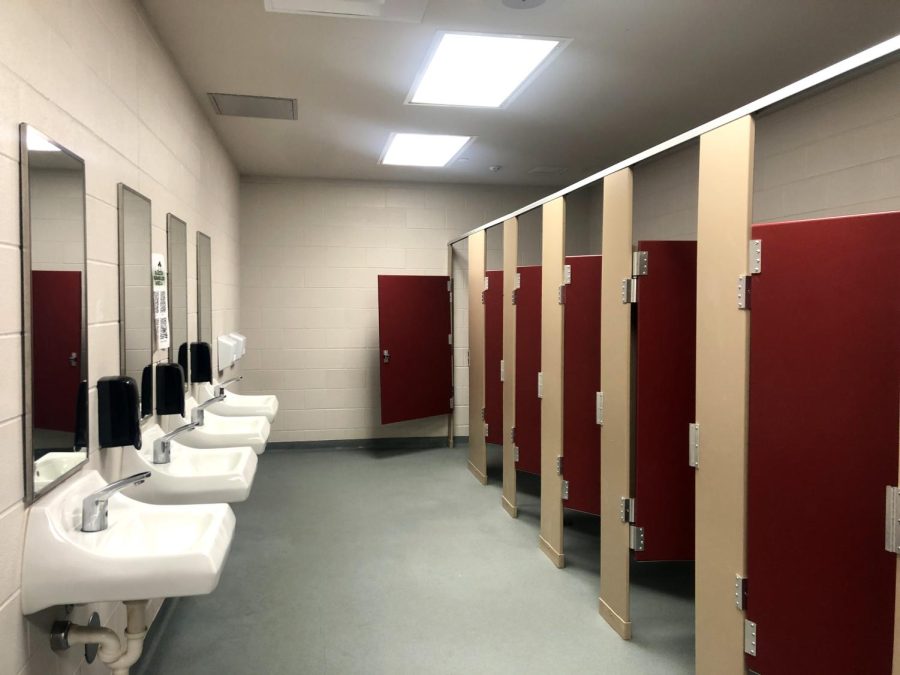Why don’t LISD Bathrooms have Menstrual Products?
Tampons and pads are as essential as toilet paper
Thousands of students get their periods every month, and plenty of us get them at school. Those who menstruate have heard the same classic horror stories: bleeding through your clothes, rushing to the bathroom, and realizing that you don’t have any pads or tampons.
One concerned Austin ISD parent, Snow White, made it her mission to ensure new generations will not be exposed to this shame. After working with school board members to fundraise, their district has stocked girls’ and gender neutral bathrooms with free menstrual products. So why doesn’t Leander ISD do the same?
If LISD has students’ best interests in mind, they should stock the bathrooms with free menstrual products. Students shouldn’t be missing class because they were caught without necessary period care.
Parts of the United States are already taking action. As of Oct. 12, 2022, 18 states in the U.S. have required period products in schools. 32 states, including Texas, have yet to mandate it. However, in Austin, schools are taking significant strides to make this happen. Last summer, AISD spent $70,000 on menstrual products to provide to students at no cost by installing dispensers in the bathrooms.
“Honestly, I feel like that is a really smart thing because it shows that faculty and board members really care about their students,” sophomore Beth Maryott said. “Not having that is kind of a level of neglect for the people that spend most of their [high school career] in this school. It’s neglectful to not have those products available.”
Some students can’t afford period products. A study published in the journal of Obstetrics and Gynecology in 2019 found that 64% of low-income women surveyed struggled to buy period products during 2018, and 21% had this problem monthly. In a lifetime a person will have 456 periods which each last from three to seven days. According to birth control delivery company Pandia Health, the price of tampons for a lifetime would be $1,777.33, and $4,752 for pads. Studies have already shown these costs are out of reach for a significant percentage of our population, so why should students be forced to spend these amounts on basic necessities?
“My grandmas told me how they didn’t have period products growing up because they were not affordable,” sophomore Surya Sai Ameya Meduri said. “Their families were huge and they couldn’t afford pads for every single one of their daughters. They had to use makeshift period products. They’ve told me, ‘I wish we had access to better products because not having [them] and using cloths wasn’t healthy.’”
A study done by Harris Insights & Analytics showed just how much the stress of inaccessible period products can impact students’ indication. They also found that 25%, or one in every four, missed class because they didn’t have access to tampons or pads. Even in school, sometimes students would miss class time just visiting the nurse.
“I have [skipped school on my period] before,” Meduri said. “I’ve done that – I was just in so much pain. I wish teachers were more understanding of period days off too. I feel like everyone needs that because a lot of people don’t feel great. Sometimes if it’s too much to handle, I either call my mom to come pick me up or I just don’t come to school.”
According to college student publication Spoon University, the fear and embarrassment of period leakage can prevent students from participating in class. Without the proper focus, they do not learn what they need to and their education is forever impacted.
“Pink tax is a very real thing, and it makes products like that very expensive, especially on a monthly basis,” sophomore Riyanjali Sengupta said. “But I think it would [also] help bring more unity to the school when making girls and women feel more accepted. It’s not a thing that’s like, ‘Ew! Gross!’ It’s just normal.”
It is crucial that our school supplies period products. We can work with organizations such as GoAuntFlow and Period to help bring these to our school. These organizations provide products monthly and dispensers installed in the bathrooms.
One common concern among those interviewed was that trends on TikTok and other social media could incite students to take advantage of new pad/tampon dispensers.
“I feel like that’s just a thing that happens with teenagers,” Sengupta said. “They try to be funny, they take too many, they put them on the walls. But this is a situation where the benefits could outweigh the possible cons.”
No one should be forced to go through the school day without period care. Students should not have to worry about being caught without pads or tampons again.
“They could have menstruation products in the bathrooms because again, it’s a matter of hygiene,” Maryott said. “If we didn’t have soap and toilet paper in the bathrooms we’d riot, but we kind of stand by on menstruation because we’re too ashamed to talk about it.”




